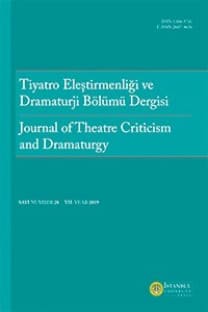“Everywhere is Warmer than the house”: ‘Traumaculture’ in Laura Wade’s Colder Than Here
Contemporary British theatre is a crucial avenue for staging trauma as theatre provides both the potential of emotional identification and critical perspective. By making use of the unique possibilities of embodied performance, theatre allows for a safe space in which traumatic suffering can be reconfigured. Drawing on the notion of Roger Luckhurst’s ‘traumaculture,’ this paper interrogates the extent to which contemporary British playwright Laura Wade’s one-act play, Colder Than Here (2005), situates current traumatic experiences within social and cultural contexts. This paper deals with terminal disease increases, familial dysfunction, and ecological degradation as traumatic experiences that permeate daily existence. Therefore, by bringing into the spotlight the contemporary definition of trauma and traumaculture, this paper aims at exploring how Colder Than Herereflects multifaceted engagements with traumatic cultural experiences onstage with a focus on a middle-class English family.
Anahtar Kelimeler:
Trauma, Traumaculture, Trauma theory, Colder Than Here, Laura Wade
“Everywhere is Warmer than the house”: ‘Traumaculture’ in Laura Wade’s Colder Than Here
Contemporary British theatre is a crucial avenue for staging trauma as theatre provides both the potential of emotional identification and critical perspective. By making use of the unique possibilities of embodied performance, theatre allows for a safe space in which traumatic suffering can be reconfigured. Drawing on the notion of Roger Luckhurst’s ‘traumaculture,’ this paper interrogates the extent to which contemporary British playwright Laura Wade’s one-act play, Colder Than Here (2005), situates current traumatic experiences within social and cultural contexts. This paper deals with terminal disease increases, familial dysfunction, and ecological degradation as traumatic experiences that permeate daily existence. Therefore, by bringing into the spotlight the contemporary definition of trauma and traumaculture, this paper aims at exploring how Colder Than Herereflects multifaceted engagements with traumatic cultural experiences onstage with a focus on a middle-class English family.
Keywords:
Trauma, Traumaculture, Trauma theory, Colder Than Here, Laura Wade,
___
- Balaev, Michelle. Contemporary Approaches in Literary Trauma Theory. New York: Palgrave Macmillan, 2014. google scholar
- Caruth, Cathy. Trauma: Explorations in Memory. Baltimore: Johns Hopkins UP, 1995. google scholar
- Caruth, Cathy. Unclaimed Experience: Trauma, Narrative, and History. Baltimore: Johns Hopkins UP, 1996. google scholar
- Diagnostic and Statistical Manual of Mental Disorders: DSM-5. 5th ed. Washington, D.C.: American Psychiatric Association, 2013. google scholar
- Duggan, Patrick. Trauma-Tragedy: Symptoms of Contemporary Performance. Manchester: Manchester University Press, 2012. google scholar
- Fisher, Philip. “Colder Than Here,” British Theatre Guide. Retrieved from: https://www.britishtheatreguide. info/reviews/colderthanhere-rev.htm google scholar
- Freud, Sigmund. Introductory Lectures on Psycho-Analysis, Part III: General Theory of the Neuroses. Standard Ed. Vol. 16. London: Hogarth Press, 1963. google scholar
- Garland, Caroline. Understanding Trauma a Psychoanalytical Approach. 2nd ed. London: Karnac, 2002. google scholar
- Griffiths, Jennifer L. Traumatic Possessions: The Body and Memory in African American Women’s Writing and Performance. Charlottesville: University of Virginia Press, 2010. google scholar
- Haughton, Miriam. Staging Trauma: Bodies in Shadow. London: Palgrave Macmillan, 2018. google scholar
- Jackson, Shannon. Professing Performance: Theatre in the Academy from Philology to Performativity. Cambridge: Cambridge University Press, 2004. google scholar
- Kritzer, Amelia Howe. Political Theatre in Post-Thatcher Britain: New Writing 1995-2005. Basingstoke: Palgrave, 2008. google scholar
- LaCapra, Dominick. Writing History, Writing Trauma. Baltimore: John Hopkins University Press, 2001. google scholar
- Latour, Bruno. Politics of Nature: How to Bring the Sciences into Democracy, trans. C. Porter. Cambridge, MA: Harvard University Press, 2004. google scholar
- Laub, Dori and Shoshana Felman. Testimony: Crises of Witnessing in Literature, Psychoanalysis, and History. London: Routledge, 1992. google scholar
- Little, Suzanne. “Repeating Repetition: Trauma and Performance”, Performance Research: A Journal of the Performing Arts, 20 (5) (2015), 44-45. google scholar
- Luckhurst, Roger. “Traumaculture,” New Formulations 50 (2003), 28-47. google scholar
- Luckhurst, Roger. The Trauma Question. London and New York: Routledge, 2008. google scholar
- May, Theresa J. “Radical Empathy, Embodied Pedagogy, and Climate Change Theatre.” HowlRound April 20, 2016. google scholar
- Nixon, Rob. Slow Violence, Gender and the Environmentalism of the Poor. Massachussetts: Harvard University Press. 2011. google scholar
- Seltzer, Mark. “Wound Culture: Trauma in the Pathological Public Sphere”, October 80 (1997), 3-26. google scholar
- Sierz, Alex. “Introduction,” in Laura Wade Plays One. London: Oberon, 2012. google scholar
- Turner, Victor. “Liminality and Communitas”, in The Performance Studies Reader. Ed. Henry Bial, 2nd ed. (89-97). Didcot: Routledge, 2007. google scholar
- Vickroy, Laurie. Trauma and Survival in Contemporary Fiction. Charlottesville: University of Virginia Press, 2002. google scholar
- Wade, Laura. Colder Than Here, in Laura Wade Palys One. London: Oberon, 2012. google scholar
- Wald, Christina. Hysteria, Trauma and Melancholia: Performative Maladies in Contemporary Anglophone Drama. New York: Palgrave Macmillan, 2007. google scholar
- Whitehead, Anne. Trauma Fiction. Edinburgh: Edinburgh University Press, 2004. google scholar
- ISSN: 1303-8605
- Yayın Aralığı: Yılda 2 Sayı
- Başlangıç: 2002
- Yayıncı: İstanbul Üniversitesi
Sayıdaki Diğer Makaleler
Fotoğraf, Ses, Kayıt Üçgeninde Tiyatro: Amazonlar’dan Televizyon Ekranına “The Encounter”
“Everywhere is Warmer than the house”: ‘Traumaculture’ in Laura Wade’s Colder Than Here
Pandemi Sonrası Oyunculuk Eğitiminde Online Teknolojilerin Kullanımı Üzerine Bir Değerlendirme
